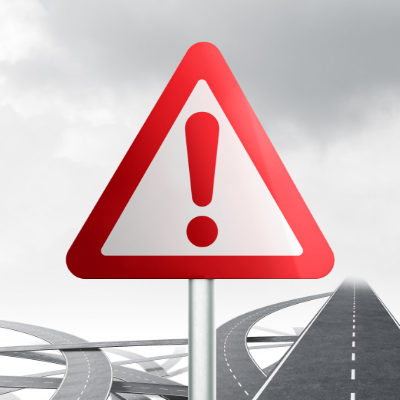Let's kick back and be ourselves.

Be realistic. Be responsive. Be ready.
Looking at the latest price of gas, it’s pretty easy to tell that the economy has seen better days. As inflation continues to surge and potentially edge toward stagflation, financial organizations are providing some grim predictions for the near future. Last month, the Deutsche Bank stated that they expect a major recession rather than a mild one to hit between late 2023 and early 2024. If you need a sign to realize there are some rougher days ahead, here it is: "CAUTION, HAZARD AHEAD."
Recessions are tough for businesses and organizations. They are typically dealt with by decreasing spending. Because of its slow burn and difficulty in measuring, marketing is one of the first areas in which we see cost-cutting. Unfortunately, the short-term benefit of cost reduction can have a long-term negative impact on the organization as it fails to be a relevant part of the marketplace conversation.
The solution? Don’t wait until the recession hits to respond. Start working on your marketing strategy now. Recession-proof your marketing efforts by better understanding your customers’ purchasing decisions and strategizing your response to possible changes in consumer behavior. Ignore the cure-all marketing gimmicks that tell you to focus exclusively on single tactics like social media, paid advertising or SEO. Of course they provide value as a part of a larger strategy, but by themselves, they don’t recession-proof your business.
Real and lasting impact happens when your marketing strategy is developed within the context of the entire customer journey. This is because today’s customer purchase decision is based on a series of moments that consciously and subconsciously build a preference over time and cause an individual to act. Practically no one wakes up one day and randomly clicks on a digital ad to buy a car. That decision and the preferences that determine the outcome happen because of a much longer process.
With a deep understanding of this customer journey, you are better equipped to know what areas can be improved, trimmed or removed completely. Even better, you will be able to see strategic opportunities to leverage changes in consumer behavior to your favor. Armed with this insight, your marketing strategy can become the difference between surviving or thriving in a challenging market.
Understanding the customer experience in this way doesn’t happen by accident. You may feel like you’ve got a good understanding of your customer. You may have created a few target audience profiles. You may even be able to show what your customer encounters while visiting your website. But few companies have taken the time to consider the experience of the customer from the moment they realize they need a product or service, all the way until they become a loyal advocate for the company. This is the key to developing a recession-proof marketing plan.
In his typical flamboyant fashion, Elon Musk recently tweeted the following about the possibility of a recession—"Yes, but this is actually a good thing. It has been raining money on fools for too long. Some bankruptcies need to happen." Don’t let that be your company. If you need help getting started, join us next month as Big presents a webinar on the potential impact of creating a Customer Experience Map and what it could mean for your organization.

Ben Gregory is the Strategy Director at Big. He has worked to improve the marketing strategies of companies and not-for-profits for over 25 years. His experience includes working with B2C and B2B organizations, domestically and internationally.